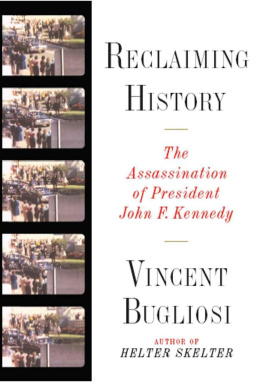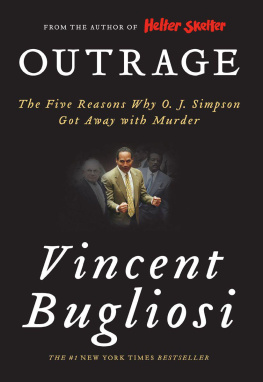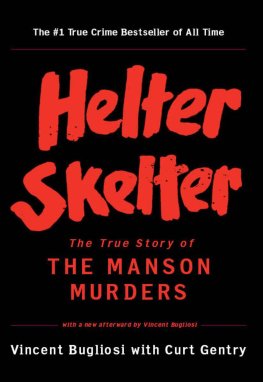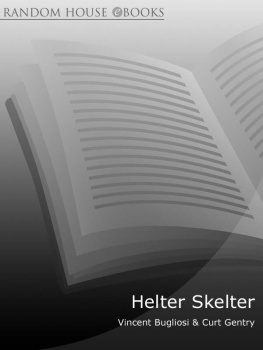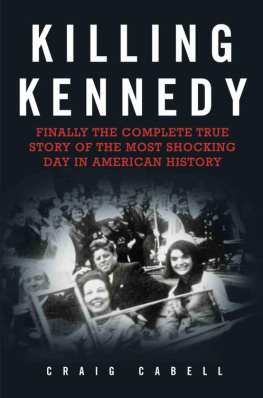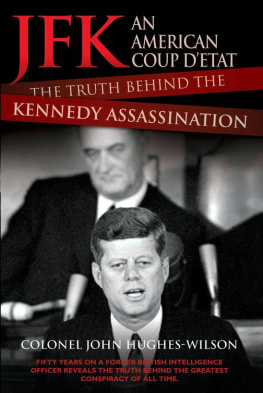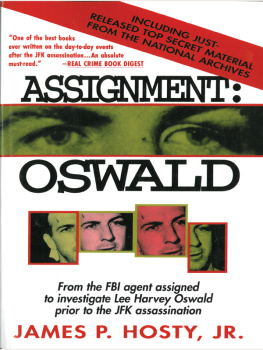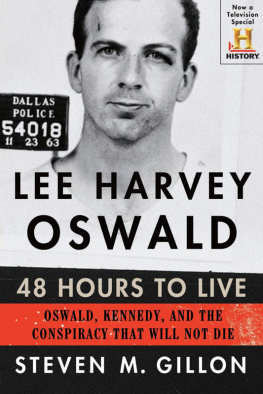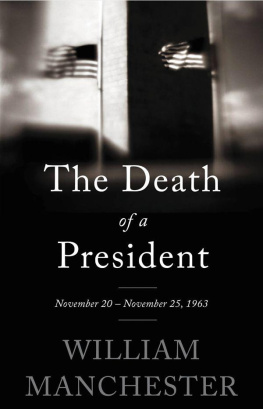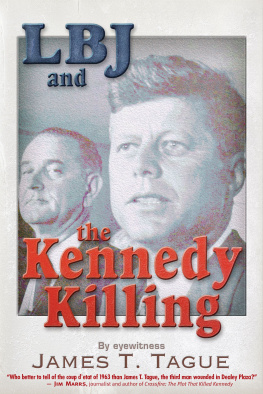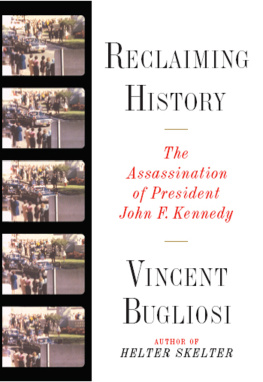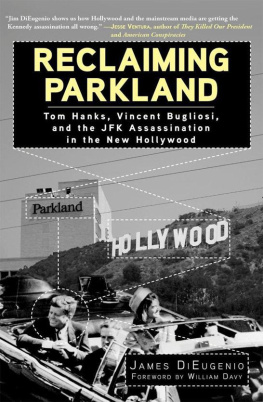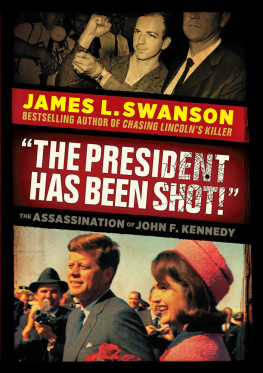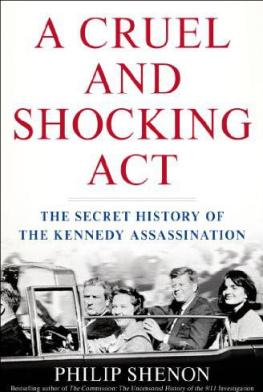Outrage: The Five Reasons Why O. J . Simpson Got Away with Murder
No Island of Sanity: Paula J ones v. Bill Clinton: The Supreme Court on Trial
The Betrayal of America: How the Supreme Court Undermined the Constitution and Chose Our President (with forewords by Molly Ivins and Gerry Spence)
RECLAIMING HISTORY
THE ASSASSINATION OF PRESIDENT JOHN F. KENNEDY
VINCENT BUGLIOSI
W. W. NORTON & COMPANY NEW YORK LONDON
Copyright 2007 by Vincent Bugliosi
All rights reserved
For information about permission to reproduce selections from this book, write to Permissions,
W. W. Norton & Company, Inc.,
500 Fifth Avenue, New York, NY 10110
Library of Congress Cataloging-in-Publication Data
Bugliosi, Vincent.
Reclaiming history: the assassination of President John F. Kennedy / Vincent Bugliosi.1st ed.
p. cm.
Includes bibliographical references.
ISBN: 978-0-393-07212-9
1. Kennedy, John F. (John Fitzgerald), 19171963Assassination. 2. Oswald, Lee Harvey. 3. ConspiraciesUnited States. I. Title.
E842.9.B84 2007
973.922092dc22
2007001545
W. W. Norton & Company, Inc.
500 Fifth Avenue, New York, N.Y. 10110
www.wwnorton.com
W. W. Norton & Company Ltd.
Castle House, 75/76 Wells Street, W1T 3QT
To the historical record, knowing that nothing in the present can exist without the paternity of history, and hence, the latter is sacred, and should never be tampered with or defiled by untruths .
Contents
BOOK ONE
Matters of Fact: What Happened
BOOK TWO
Delusions of Conspiracy: What Didnt Happen
Introduction
At approximately 12:30 p.m. on November 22, 1963, while President John F. Kennedy, the most powerful man in the free world, rode in his presidential limousine slowly past the Texas School Book Depository Building and down Elm Street in Dallas, Texas, three shots rang out from the southeasternmost window on the sixth floor of the building. One of the bullets struck the president in the upper right part of his back and exited the front of his throat, another entered the right rear of his head, exiting and shattering the right side of his head. While the presidential limousine screeched away to Parkland Memorial Hospital, where he was pronounced dead shortly thereafter, John F. Kennedy, his life blood gushing from his body, lay mortally wounded on his wife Jacquelines lap. The assassin had succeeded in brutally cutting down, at the age of forty-six, the thirty-fifth president of these United States, a man whose wit, charm, and intelligence had captivated a world audience. The assassins bullets had also extinguished a flame of hope for millions of Americans who saw in the youthful president at least the promise of excellence in national life.
As the years have shown, Kennedys assassination immediately transformed him into a mythical, larger-than-life figure whose hold on the nations imagination resonates to this very day. The image of Kennedy is not based on what he accomplished, but on his promise, the hope he held out, said historian Stephen Ambrose in 1993.1 Years earlier, New York Times columnist James Reston wrote similarly that what was killed in Dallas was not only the President but the promise. The heart of the Kennedy legend is what might have been. All this is apparent in the faces of the people who come daily to his grave on the Arlington Hill.2 In 1993, Ambrose added, Theres a very strong sense that if he had not died, we would not have suffered the 30 years of nightmare that followedthe race riots, the white backlash, assassinations, Vietnam, Watergate, Iran-Contra.3 While this is, of course, speculative, what is not is JFKs legacy of rekindling the notion that public service is a noble calling. If it is any barometer of the sense of hope and promise that Kennedy inspired in the American people, the ever-decreasing trust by Americans in their government down through the years started with the Kennedy assassination and the subsequent erroneously perceived notionfostered by conspiracy theoriststhat the government concealed the full truth about the assassination from them. Trust in our leaders in Washington to do what is right for the people plummeted from 76 percent around the time of the assassination to a low of 19 percent three decades later.4 Theres such a gulf in history between the day before and the day after Kennedys assassination, says historian Howard Jones of the University of Alabama. Its as if we passed through a hundred years in a day.5 In 2004, a national poll showed that trust in our government to do whats right was only at 36 percent.6
Since Kennedys death, the nation has not seen, in any of his successors, his cosmopolitan intellectualism or the oratorical eloquence with which he sought to lead the nation by the power of his words. What also is beyond dispute was the way Kennedy, the first president born in the twentieth century, inspired the young of his generation by his youthful vigor and the bold, fresh initiatives of his New Frontier, such as his Peace Corps, civil rights bills, and pledge to put a man on the moon. Idealism was in the air, and the nations capital had never seen such an invasion of young people who wanted to change the world for the better. The most accurate indicator of Kennedys popularity among the nations youth at the time is a 2003 Gallup Poll of people of various age groups as to whom they regarded as our greatest president. In the fifty-to-sixty-four-year age group, those who were young during Kennedys presidency, Kennedy ranked number one among all presidents. Among all age groups he ranked number two, behind only Lincoln.7
Undoubtedly, two other factors have burnished and enlarged the Kennedy aura. He was among the most attractive and naturally charismatic public figures the nation has seen. And the Choate-and Harvard-educated son of privilege he commanded when it was cut in half and sunk by the Japanese destroyer Amagiri , by swimming four hours to the nearest island towing the man by attaching a strap from the mans life jacket to his teeth. In a typical example of Kennedys well-known laconic wit, when he was once asked how he became a war hero, he responded with his famous understated smile, It was involuntary. They sank my boat.
Kennedys magic started with the people (particularly, as indicated, the young, to whom the words of his inaugural address seemed to be aimed), as evidenced by the fact that although he had won the presidency with only 49.7 percent of the popular vote, a Harris Poll right after his inaugural showed his approval rating jumping up to an incredible 92 percent. Though his rating would soon return to the atmosphere, the speech, considered by many one of the finest inaugural addresses in the nations history, demonstrated that Kennedy was no ordinary politician. It wasnt just the words of the speech (Ask not what your country can do for youask what you can do for your country; Let the word go forth from this time and place to friend and foe alike, that the torch has been passed to a new generation of Americansborn in this century, tempered by war, disciplined by a hard and bitter peace [cold war], proud of our ancient heritage), but the dramatic way in which he uttered them on this memorably bright day, a day, author Thurston Clarke wrote, where the cold winter air turned his breath into white clouds, the words appearing to be going forth into the exhilarating air. God, Id like to be able to do what that boy did there, his political opponent Barry Goldwater said. The power in Kennedys delivery of the words had to be helped by the fact that apart from the Ask not clause, the words were written by him and told his own story.9

